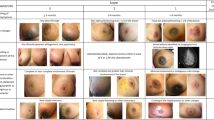Abstract
Distinction between benign reactive mesothelial cells and metastatic breast adenocarcinoma cells in effusions from patients with a known prior history of breast cancer is not the easiest task in diagnostic pathology. Here, we report the usefulness of testing the expression of class I HLA antigens (HLA A, B, C) in this respect. Cytospins were prepared from effusions of patients without the history of breast cancer (5 cases) and from effusions of patients with infiltrating ductal carcinoma (11 cases). Three effusions from cancerous patients were not malignant cytologically. The expression of HLA-A, B, C, HLA-DR and β2-microglobulin as well as the macrophage antigen, CD14, was evaluated by immunocytochemistry. In 10 of 11 effusions the cytologically malignant cells expressed very weak or undetectable HLA-A,B,C as compared to the mesothelial cells and macrophages. The paucity of expression of HLA-A, B, C was detectable in those 3 cases where a definitive cytological diagnosis of malignancy could not be established. In contrast, mesothelial cells and macrophages from all samples were uniformly and strongly positive for both HLA-A, B, C and β2-microglobulin. We conclude that the paucity of HLA-I antigens provides a marker helpful in distinguishing metastatic breast carcinoma cells from reactive mesothelial cells in effusions.
Similar content being viewed by others
References
Corsdon JM, Pinkus GS: Mesothelioma: profile of keratin proteins and carcinoembryonic antigen. Am J Pathol 108:80–87, 1982.
Said JW, Nash G, Banks-Schlegel S, et al: Keratin in human lung tumors: patterns of lokalization of different molecular-weight keratin proteins. Am J Pathol 113:27–32, 1983.
To A, Coleman DV, Dearnaley DP, et al: Use of antisera to epithelial membrane antigen for the cytodiagnosis of malignancy in effusions. J Clin Pathol 34:1326–1332, 1981.
Walts AE, Said JW: Specific tumor markers in diagnostic cytology: immunoperoxidase studies of carcinoembryonic antigen, lysozyme and other tissue antigens in effusions, washes and aspirates. Acta Cytol 33:356–360, 1980.
Concha A, Esteban F, Cabrera T, et al: Tumor aggressiveness and MHC class I and II antigens in laryngeal and breast cancer. Semin Cancer Biol 2:47–54, 1991.
Kaklamanis L, Leek R, Koukourakis M, et al: Loss of transporter in antigen processing 1 transport protein and major histocompatibility complex class I molecules in metastatic versus primary breast cancer. Cancer Res 55:5191–5194, 1995.
Vitale M, Rezzani R, Rodella L, et al: HLA class I antigen and transporter associated with antigen processing downregulation in high-grade primary breast carcinoma lesions. Cancer Res 58:737–742, 1998.
Joseph MG, Banerjee D, Harris P, et al: Multiparameter flow cytometric DNA analysis of effusions: a prospective study of 36 cases compared with routine cytology and immunocytochemitry. Mod Pathol 8:686–693, 1995.
Chen LM, Lazcano O, Katzman JA, et al: The role of conventional cytology, immunocytochemistry and flow cytometric DNA ploidy in the evaluation of body cavity fluids: a prospective study of 52 patients. Am J Clin Pathol 109:712–721, 1998.
Fleming KA, McMichael A, Morton JA, et al: Distribution of HLA class I antigens in normal human tissue and in mammary cancer. J Clin Pathol 34:779–784, 1981.
Travers PJ, Arble J, Trowsdale J, et al: Lack of expression of HLA-A,b,c antigens in choriocarcinoma and other human cell lines. Natl Cancer Inst Monogr 60:175–185, 1981.
Lampson LA, Fisher CA, Whelan JP: Striking paucity of HLA-A,B,C and b2 microglobulin on human neuroblastoma lines. J Immunol 130:2471–2478, 1983.
Amiot L, Onno M, Lamy T, et al: Loss of HLA molecules in B lymphomas is associated with an aggressive clinical course. Br J Haematol 100:655–663, 1998.
Glasova M, Konikova E, Stasakova J, et al: The relationship of HLA-DR, CD38 and CD71 markers to activation, proliferation and differentiation of some human leukemia and lymphoma cells. Neoplasma 45:88–95, 1998.
Klein T, Levin I, Niska A, et al: Correlation between tumour and serum beta2m expression in patients with breast cancer. Eur J Immunogenet 23:417–423, 1996.
Author information
Authors and Affiliations
Rights and permissions
About this article
Cite this article
Magyarosy, E., Martin, W.J., Chu, E.W. et al. Differential diagnostic significance of the paucity of HLA- I antigens on metastatic breast carcinoma cells in effusions. Pathol. Oncol. Res. 5, 32–35 (1999). https://doi.org/10.1053/paor.1999.0032
Received:
Accepted:
Issue Date:
DOI: https://doi.org/10.1053/paor.1999.0032




